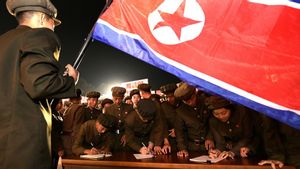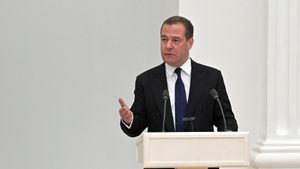JAKARTA - Gas prices in Europe jumped more than 2 percent on Friday, December 27, after Russian President Vladimir Putin announced the halt to the main line of gas transport through Ukraine. The move sparked concerns over the energy supply amid the ongoing conflict between the two countries.
European gas reference prices rose to around 47 euros per megawatt hour, the highest in the last three weeks. The increase comes after Putin stated there was not enough time to reach a new deal regarding gas transits before the existing contracts expire at the end of the year.
"They (Ukraine) have announced that they will not renew the contract. There is no contract, and it is impossible to complete it within three to four days," Putin said in a televised briefing on Thursday, December 26, as reported by The Telegraph, Saturday, December 28.
Despite the war, Russia is still exporting gas to a number of European countries via the Urengoy 'Pomary-Uzhhorod' pipeline, known as the Brotherhood pipeline. This route crosses the northeastern region of Ukraine, along the Dnipro River, and ended up on Ukraine's western border before flowing into countries such as Slovakia, Hungary, and Austria.
This line is a source of huge revenue for Russia and Ukraine. By 2024, Russia is estimated to have grossed about $5 billion from gas sales through Ukraine, while Ukraine earned about $1 billion from transit costs.
However, Ukrainian President Volodymyr Zelenskyy insists his side will not renew the contract unless Russia agrees to postpone payments until the war ends a condition Moscow has rejected.
VOIR éGALEMENT:
The dependence of European countries on Russian gas remains high, although many countries have reduced their energy ties to Moscow since the conflict began. Slovakia, for example, is still getting 60 percent of its gas supply from Russia through Ukraine by 2023, while Hungary relies on Russia's energy for 80 percent of its energy needs.
Austria previously received more than 90 percent of its gas from Russia before the contract dispute sparked a supply shutdown by Gazprom in November. However, the Slovak government and its partners in Hungary, Austria, and Italy are working to extend the deal to maintain the stability of their energy supply.
Putin's move has the potential to exacerbate the energy crisis in Europe, forcing countries to rely on limited alternative routes, including gas pipelines through Turkey.
The impact of this policy will be a big test of Europe's energy resilience this winter. How European countries address this challenge will be the main focus in the midst of geopolitics that continue to heat up.
The English, Chinese, Japanese, Arabic, and French versions are automatically generated by the AI. So there may still be inaccuracies in translating, please always see Indonesian as our main language. (system supported by DigitalSiber.id)












